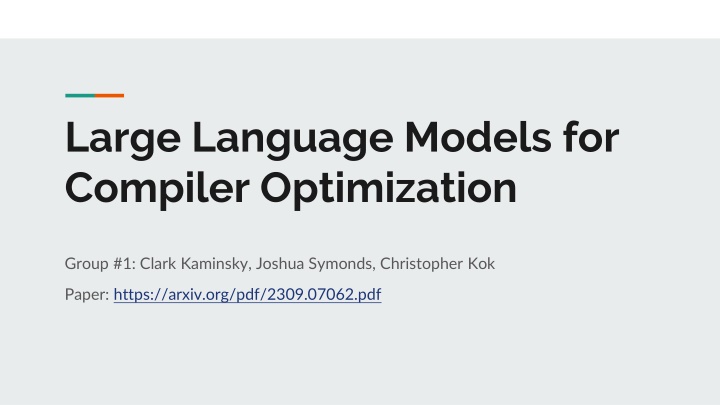
Optimizing Code with Large Language Models: Insights and Innovations
Explore the potential of large language models for compiler optimization, understanding code optimization complexities, and leveraging machine learning for intelligent decision-making. Discover the impact of pass ordering and the transformative self-attention architecture in optimizing code for improved performance.
Download Presentation

Please find below an Image/Link to download the presentation.
The content on the website is provided AS IS for your information and personal use only. It may not be sold, licensed, or shared on other websites without obtaining consent from the author. If you encounter any issues during the download, it is possible that the publisher has removed the file from their server.
You are allowed to download the files provided on this website for personal or commercial use, subject to the condition that they are used lawfully. All files are the property of their respective owners.
The content on the website is provided AS IS for your information and personal use only. It may not be sold, licensed, or shared on other websites without obtaining consent from the author.
E N D
Presentation Transcript
Large Language Models for Compiler Optimization Group #1: Clark Kaminsky, Joshua Symonds, Christopher Kok Paper: https://arxiv.org/pdf/2309.07062.pdf
Introduction ~ Code Optimization -fauto-inc-dec -fbranch-count-reg -fcombine-stack-adjustments -fcompare-elim -fcprop-registers -fdce -fdefer-pop -fdelayed-branch -fdse -fforward-propagate -fguess-branch-probability -fif-conversion -fif-conversion2 -finline-functions-called-once -fipa-modref -fipa-profile -fipa-pure-const -fipa-reference -fipa-reference-addressable -fmerge-constants -fmove-loop-invariants -fmove-loop-stores -fomit-frame-pointer -freorder-blocks -fshrink-wrap -fshrink-wrap-separate -fsplit-wide-types -fssa-backprop -fssa-phiopt -ftree-bit-ccp -ftree-ccp -ftree-ch -ftree-coalesce-vars -ftree-copy-prop -ftree-dce -ftree-dominator-opts -ftree-dse -ftree-forwprop -ftree-fre -ftree-phiprop -ftree-pta -ftree-scev-cprop -ftree-sink -ftree-slsr -ftree-sra -ftree-ter -funit-at-a-time *Some* example compilation flags from GCC - https://gcc.gnu.org/onlinedocs/gcc/Optimiz e-Options.html
Introduction ~ Large Language Models Machine learning models can make intelligent decisions automatically for code optimization Traditional machine learning methods require lossy code representation Why Might Large Language Models Help? Code optimization might just be too complicated for LLMs What can current LLMs accomplish? From Two Sigma Ventures
Pass Ordering ~ Whats the model actually doing? We need generalizable understanding of how to optimize code Optimizing for # of IR instructions Improve performance with Chain-Of-Thought Reasoning [1] during training time [1] Chain-of-Thought Prompting Elicits Reasoning in Large Language Models, https://arxiv.org/abs/2201.11903
The Model Transformer Architecture Self attention: capture contextual relationships between tokens to encourage the model to understand and process the semantic structure Trained-from-scratch version of Llama 2 (7B parameters) During training, the model was evaluated on a holdout validation set of 1,000 unseen IRs that were processed in the same manner as the training set every 250 steps.
Training Data Combined publicly available handwritten C/C++ code and synthetic code generated by C/C++ compiler test generators for a training corpus of 1,000,000 IR functions (373M training tokens) Using individual IR functions rather than entire modules to maximize the amount of training and testing data Used autotuning to find the list of optimization passes that will produce the smallest instruction count Autotuner combines random search and all- to-all results broadcasting between functions Huge computational cost: 9,016 CPU days Goal: Achieve some fraction of the performance of the autotuner using a predictive model without compiling thousands of times
Evaluation 4.4% fewer instructions than when optimized using the compiler s built-in pass ordering (-Oz) No compiler invocations needed! The autotuner achieves a greater instruction count reduction of 5.6%, but this required 27 million compilations of the validation set.
Quality of Code Top plot: quality the of generated code for the corresponding pass (ordered by BLEU score) Bottom plot: frequency that the corresponding pass contributed to an improvement or regression of instruction count over -Oz. Peak performance: 90.5% of the time, model generates code that compiles without errors BLEU score of 0.952: model code closely approximates that of the compiler 70% exact match
Additional Experiments 1. Dataset Size Ablation (with 25% or 50% of the dataset) performance falls ~23% 2. Optimization Task Ablation (without code generation) performance falls by 16%
Additional Experiments 3. Single Pass Translation (generating optimized code for an individual pass)
Discussion Context Window Challenges But the field is growing! (e.g. Code Llama) Arithmetic Reasoning Limitations Where we come in! Trying a curriculum of arithmetic and logic Inference Speed Considerations GPUs, batching, specializing the vocabulary
Related Work Compiler Pass Ordering History Several using Machine Learning E.g. Ogilvie et al. Minimizing the Cost of Iterative Compilation with Active Learning But none with LLMs! Language Models in Code Generation Code-based LLMs for tasks like code completion, translation, and repair E.g. Gallagher et al. RoBERTA architecture on LLVM-IR for code weakness But none specifically for compiler pass ordering!






















